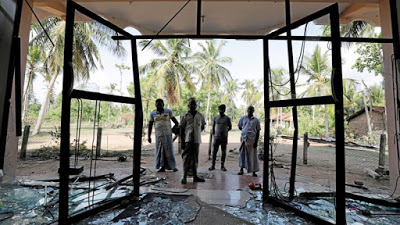Indefinite curfew in Sri Lanka province amid anti-Muslim riots
 |
| AL JAZEERA AND NEWS AGENCIES 14 May 2019 |
Nationwide curfew relaxed but police warn of ‘maximum force’ after rioters vandalise Muslim businesses and mosques.
A Sri Lankan province north of the capital, Colombo, was placed under indefinite curfew on Tuesday after anti-Muslim riots in the wake of the Easter bombings, police said.
A nationwide night curfew was relaxed in all areas except the North Western Province (NWP) where a Muslim man was killed by a mob on Monday, police said, in a violent backlash against last month’s bombings.
The 45-year-old died of injuries sustained when a crowd stormed his carpentry workshop in the Puttalam district in the NWP and slashed him, official sources said.
Police chief Chandana Wickramaratne warned of stern action against rioters, and said that constables have been issued orders to use “maximum force”.
Elsewhere in the province, mobs torched dozens of Muslim-owned shops, vandalised homes and mosques in a day of rioting.
“The curfew in the NWP will be continued until further notice,” police spokesman Ruwan Gunasekera said.
On Monday, police imposed the island-wide curfew from 9pm local time (15:30 GMT) to 4am, according to a police statement.
Curfews were previously limited to specific areas where attacks had taken place, including Puttalam, Kurunegala and Gamphala districts near Colombo.
In an address to the nation on Monday night, Prime Minister Ranil Wickremesinghe said a countrywide curfew was declared to prevent unidentified groups orchestrating communal violence.
Wickremesinghe said the unrest would hinder investigations into the April 21 attacks that targeted three churches and three luxury hotels, killing 257 people and wounding nearly 500.
Sri Lanka also temporarily banned some social media networks and messaging apps, including Facebook and WhatsApp, after a posting sparked anti-Muslim riots across several towns.
The attacks came during the Muslim holy fasting month of Ramadan.
Residents in NWP said crowds attacked mosques and damaged Muslim-owned businesses for a second day on Monday.
“There are hundreds of rioters, police and army are just watching. They have burnt our mosques and smashed many shops owned by Muslims,” a resident, who asked not to be identified, told the Reuters news agency. “When we try to come out of our house, police tell us to stay inside.”
Glass was strewn across the Abrar mosque in the town of Kiniyama that was attacked overnight. All the windows and doors of the soft-pink building were smashed and copies of the Quran were thrown onto the floor.
‘Several shops attacked’
Al Jazeera’s Minelle Fernandez, reporting from Habarana, said the violence was mainly local and sporadic and that authorities wanted to contain the attacks.
“Over the last 24 hours there were localised police curfews to contain tensions between Christians and Muslims in these particular areas,” she said. “The authorities are trying very hard to clamp down on this.”
The latest wave of unrest started when a mob targeted Muslim-owned shops in the town of Chilaw, 70 kilometres north of Colombo, on Sunday in anger at a Facebook post by a shopkeeper.
“Don’t laugh more, 1 day u will cry,” was posted as a comment on Facebook by a Muslim shopkeeper, and local Christians took it to be a warning of an impending attack.
Mobs smashed the man’s shop and vandalised a nearby mosque prompting security forces to fire in the air to disperse the crowd.
Authorities said they arrested the author of the post.
Muslims make up around 10 percent of Buddhist-majority Sri Lanka’s 21 million population and Christians about 7.6 percent.
‘Worrying trend’
Rights group Amnesty International said there was “a worrying trend of attacks against the Muslim community coming out of Sri Lanka” following the Easter Sunday bombings.
The country’s main body of Islamic scholars, the All Ceylon Jamiyyathul Ulama (ACJU), said there was increased suspicion of Muslims.
“We call upon the members of the Muslim communities to be more patient and guard your actions and avoid unnecessary postings or hosting on social media,” the ACJU said.
On Twitter, Sri Lanka’s leading mobile phone operator Dialog said it had also received instructions to block Viber, IMO, Snapchat, Instagram and Youtube until further notice.
The latest unrest came as Catholic churches resumed their public Sunday masses for the first time since the bombings.
Sri Lanka has been under a state of emergency since the attacks. Security forces and police have been given sweeping powers to arrest and detain suspects for long periods.


